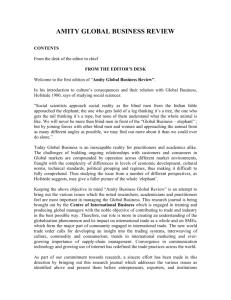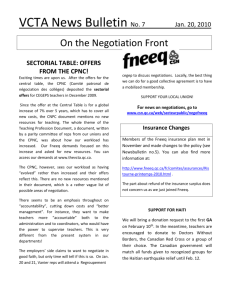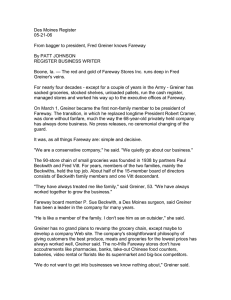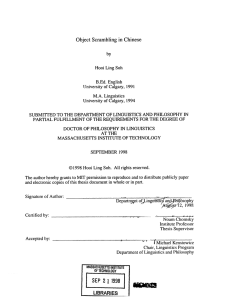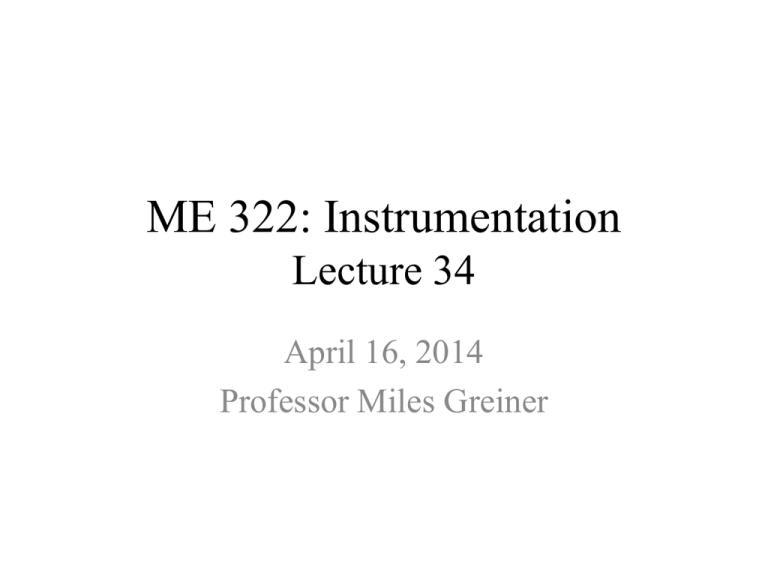
ME 322: Instrumentation
Lecture 34
April 16, 2014
Professor Miles Greiner
Announcements/Reminders
• This week: Lab 10 Vibrating Beam
• Sign up for 1.5-hour Lab 11 periods with your partner in lab
• Help wanted (see me greiner@unr.edu)
– Summer: Help construct a convection heat transfer
augmentation experiment
– Spring 2016: ME 322 Lab Assistant
Lab 11 Unsteady
Speed in a Karman
Vortex Street
• Nomenclature
– U = air speed (instead of V)
– VCTA = Constant temperature anemometer voltage
• Two steps
– Statically calibrate hot film CTA using a Pitot probe
– Find frequency, fP with largest URMS downstream from a cylinder of diameter D
for a range of air speeds U
• Compare to expectations (StD = DfP /U = 0.2-0.21)
Calibration Calculations
• Based on physical analysis we expect
2
– 𝑉𝐶𝑇𝐴
=𝑎
2𝑃𝑃
𝜌𝐴𝑖𝑟
• 𝑈=𝐶
– 𝜌𝑊 =
𝑈 +𝑏
=𝐶
𝐼 −4𝑚𝐴
2𝜌𝑊 𝑔𝐹𝑆 𝑃16𝑚𝐴
𝜌𝐴𝑖𝑟
𝑘𝑔
998.7 3
𝑚
– 𝐹𝑆 = 3 𝑖𝑛𝑐ℎ 𝑊𝐶
– 𝜌𝐴𝑖𝑟 =
• 𝑠𝑉 2
𝐶𝑇𝐴 ,
– 𝑠
𝑈
𝑃𝐴𝑇𝑀
𝑅𝐴𝑖𝑟 𝑇𝐴𝑇𝑀
𝑎
=
2
𝑈,𝑉𝐶𝑇𝐴
2.54 𝑐𝑚
𝑖𝑛𝑐ℎ
; 𝑅𝐴𝑖𝑟 =
𝑈 𝑖 +𝑏 −
𝑛−2
=
𝑠𝑉2
𝐶𝑇𝐴 , 𝑈
𝑎
1𝑚
100 𝑐𝑚
𝑘𝑃𝑎 𝑚3
0.287
𝑘𝑔 𝐾
2
𝑉𝐶𝑇𝐴
𝑖
2
IP
[mA]
4.00
5.70
7.40
9.40
11.60
16.80
14.40
13.30
11.00
8.50
6.30
4.00
VCTA
[V]
2.140
3.670
3.930
4.070
4.130
4.460
4.340
4.290
4.160
4.000
3.820
2.140
1/2
U
U
[m/s] [m1/2/s1/2]
0.0
0.00
12.4
3.52
17.5
4.18
22.0
4.70
26.2
5.11
33.9
5.83
30.6
5.53
28.9
5.38
25.1
5.01
20.1
4.49
14.4
3.79
0.0
0.00
VCTA2
[V2]
4.58
13.47
15.44
16.56
17.06
19.89
18.84
18.40
17.31
16.00
14.59
4.58
Process Sample Data
• http://wolfweb.unr.edu/homepage/greiner/teac
hing/MECH322Instrumentation/Labs/Lab%20
11%20Karmon%20Vortex/Lab%20Index.htm
Hot Film System Calibration
• The fit equation VCTA2 = aU0.5+b appears to be appropriate
for these data.
Unsteady Karman Vortex Flow
Fig. 4 Spectral Content in Wake for Highest and Lowest Wind Speed
Srms [m/s]
0.4
URMS
[m/s]
(a) Lowest Speed
0.3
fp = 751 Hz
0.2
0.1
0
0
500
1000
Srms [m/s]
2000
2500
3000
f [Hz]
0.5
URMS
[m/s]
1500
(b) Highest Speed
0.4
fp = 2600 Hz
0.3
0.2
0.1
0
0
500
1000
1500
2000
2500
3000
f [Hz]
•
•
•
The sampling frequency and period are fS = 48,000 Hz and TT = 1 sec.
The minimum and maximum detectable finite frequencies are 1 and 24,000 Hz.
It is straightforward to distinguish fP from this data. Its uncertainty is Wfp = 0.5 Hz.
Dimensionless Frequency and Uncertainty
UA [m/s] WUa [m/s]
37.8
1.3
34.1
1.2
27.3
1.1
23.0
1.0
16.5
0.8
11.8
0.7
fP [Hz] wfp [Hz]
2600
50
2427
50
1892
50
1596
50
1218
50
751
50
Re
7084
6385
5121
4312
3081
2214
WRe
236
224
201
184
156
132
• UA from LabVIEW VI
– 𝑤𝑈 = 2
𝑈
𝑠
2
𝑈,𝑉𝐶𝑇𝐴
(68%)
• fP from LabVIEW VI plot
– 𝑤𝑓𝑃 = ½(1/tT) or eyeball uncertainty
• Re = UADr/m (power product)
–
𝑤𝑅𝑒 2
𝑅𝑒
=
𝑤𝑈𝐴 2
𝑈𝐴
+
𝑤𝐷 2
𝐷
+
𝑤𝜌 2
𝜌
+
• StD = DfP/UA (power product)
–
𝑤St
2
D
StD
= −
𝑤𝑈𝐴 2
𝑈𝐴
+
𝑤𝐷 2
𝐷
+
𝑤𝑓 𝑃 2
𝑓𝑃
𝑤𝜇 2
𝜇
St
0.218
0.226
0.220
0.220
0.235
0.202
WSt
0.008
0.009
0.010
0.012
0.015
0.018
Fig. 5 Strouhal versus Reynolds
0.300
0.250
0.200
St
Expected St Range
0.150
0.100
0.050
0.000
0
1000
2000
3000
4000
5000
6000
7000
8000
Re
• The reference value is from A.J. Wheeler and A.R. Ganji, Introduction to
Engineering Experimentation, 2nd Edition, Pearson Prentice Hall, 2004, p. 337.
• Four of the six Strouhal numbers are within the expected range.
How to Construct VI (Block Diagram)
Spectral Measurements
Selected Measurements: Magnitude (RMS)
View Phase: Wrapped and in Radians
Windowing: Hanning
Averaging: None
Formula
Formula: ((v**2-b)/a)**2
Front Panel

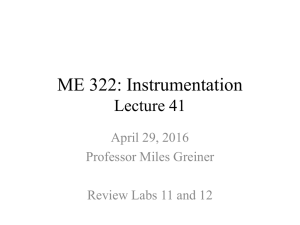
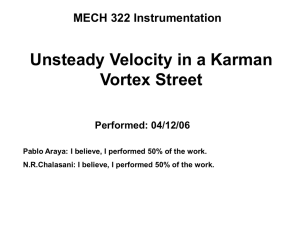


![[More] Computer Science for All - Thomas Jefferson High School for](http://s3.studylib.net/store/data/008244419_1-2704a8ab7f1236a19a3e42eef9f09021-300x300.png)

